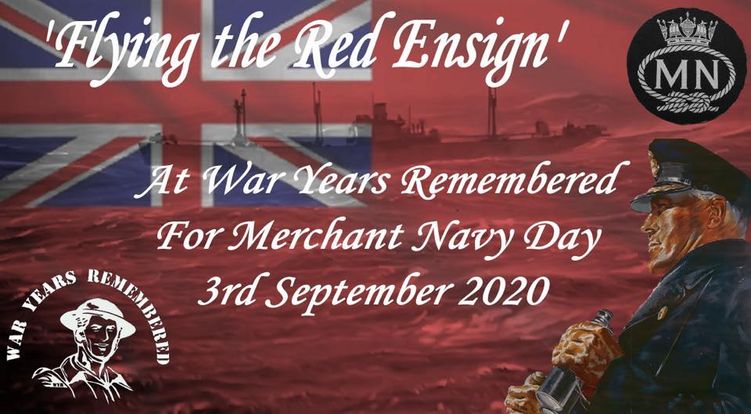On this day the 3rd September, Merchant Navy Day.
Today we fly the Red Ensign or what was nicknamed the Red Duster, the flag of the British Merchant Navy, to commemorate the brave men and women who kept our island nation ‘afloat’ during both times of peace and war. Merchant Navy Day became an official day of remembrance on the 3rd September, 2000 after years of lobbying to bring about the official recognition of the sacrifices made during the First and Second World War by the often forgotten men and women of the Merchant Navy.
During the First World War the British Empire’s merchant marine became the supply service of the Royal Navy, it shipped raw materials, transported troops and delivered arms and supplies to British armed forces. It also carried food and supplies to the home front, keeping factories in production and the people from starvation. The fishing fleet also continued its role in bringing catches into British ports. Men and women from across the British Isles and the Empire joined the merchant fleet crews, in 1914 an estimated third of these crews were born abroad and included Indian, Chinese, African, Arab and Japanese people.
German U-boats were used against British warships, but they also deliberately targeted British merchant ships as Germany introduced a policy of unrestricted submarine warfare in early 1915, and declared the area around the British Isles a war zone, in which all merchant ships, including those from neutral countries, would be attacked by the German navy. This culminated in the sinking of the British passenger ship the Lusitania on the 7th of May, 1915, killing 1,195 people, including 128 Americans. The incident prompted the U.S to demand an end to attacks against unarmed merchant ships and the German navy was persuaded to suspend U-boat warfare, until January 1917 when it was resumed.
2,479 British merchant vessels and 675 British fishing vessels were lost as a result of enemy action, with respectively 14,287 and 434 lives lost. The term Merchant Navy was coined by King George V in 1919, as recognition of the sacrifice made by merchant seafarers during the First World War. On the 14th February 1928, His Majesty King George V formally renamed the merchant marine in appointing HRH The Prince of Wales as the first ‘Master of the Merchant Navy and Fishing Fleets.’
Britain's merchant fleet was the largest in the world during both the First and the Second World War, as the outbreak of war edged closer in 1939, the British merchant fleet carried 33% of the world’s tonnage. Around 185,000 men and women served in the Merchant Navy during the Second World War, again the crews were made of up of various nationalities including British, Chinese and Indians. While they faced the same dangers of war as the regular armed forces as well as the hazards of the elements, they did so as civilians and volunteers. Their vessels ranged from passenger and large cargo ships to tramp ships and coastal vessels and the sailors served on seas and oceans across the world.
The Merchant Navy was integral to the nation’s survival, with all of Britain’s oil arriving by sea as well as half of its food and most of its raw materials. After the declaration of war in September 1939, the Ministry of Shipping (later the Ministry of War Transport) took control of the merchant fleet. The Ministry decided the cargo the ships would carry and the function they would fulfill in order to best support the war effort, while crewing and provisioning remained under the jurisdiction of the shipping industry. A convoy system was implemented, warships would escort groups of merchant ships to defend and deter against attacks from the unrestricted submarine warfare of the German U-boats. The Merchant Navy was most crucial in the longest continuing military campaign of the war- the Battle of the Atlantic. The British merchant fleet brought food, oil, supplies, equipment and raw materials from across the Atlantic and struggled against German U-boats, battleships, aircraft and mines. The Merchant Navy had a higher proportional death rate than any of the British armed forces during the Second World War, 30,248 merchant seamen lost their lives.
Since the Second World War, the British Merchant Navy has become steadily smaller (while still remaining one of the largest in the world) but has continued to help in wartime, notably during the Falklands War as well as in peacetime, being responsible for most the UK’s imports, including food and fuel.
